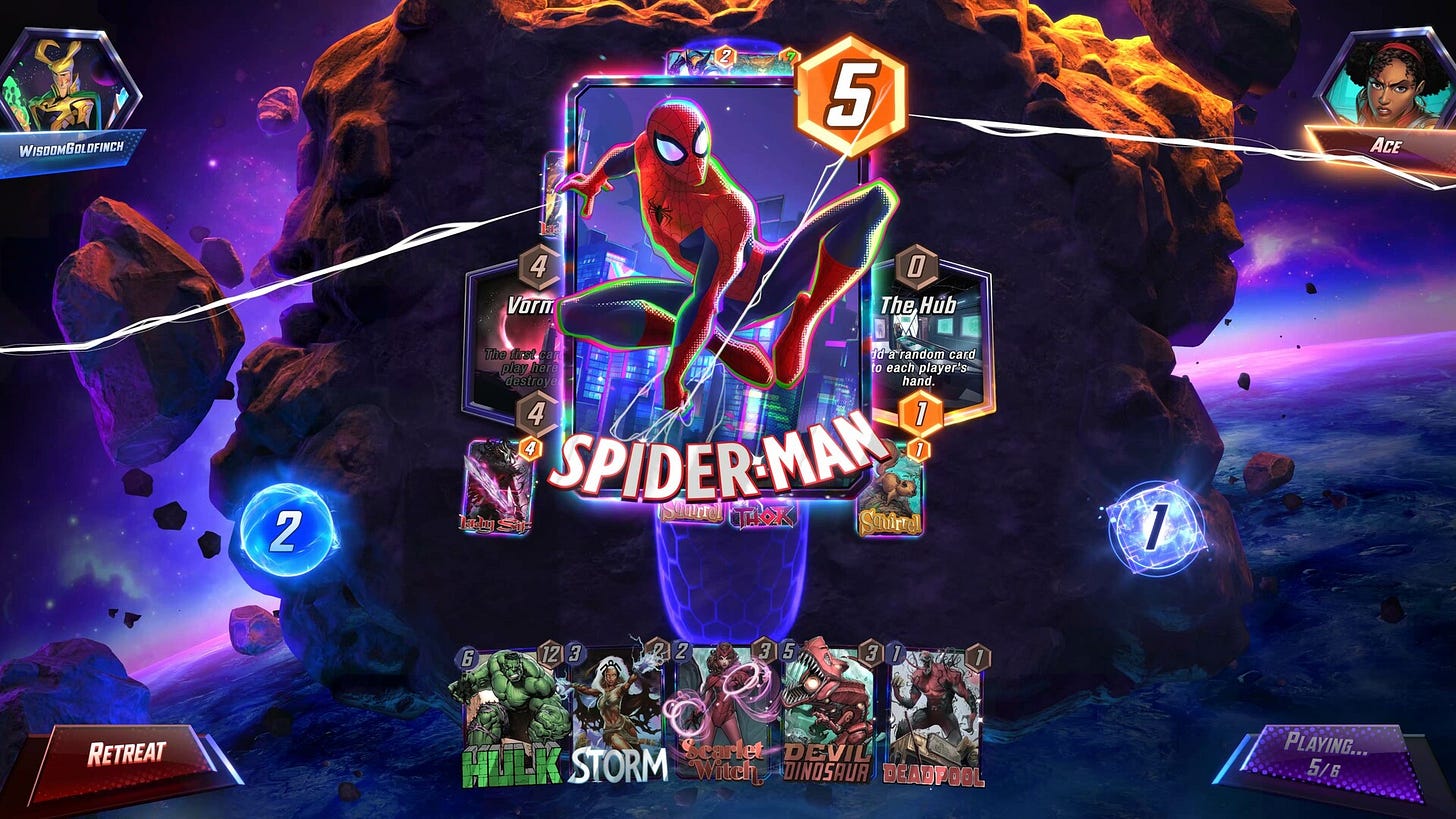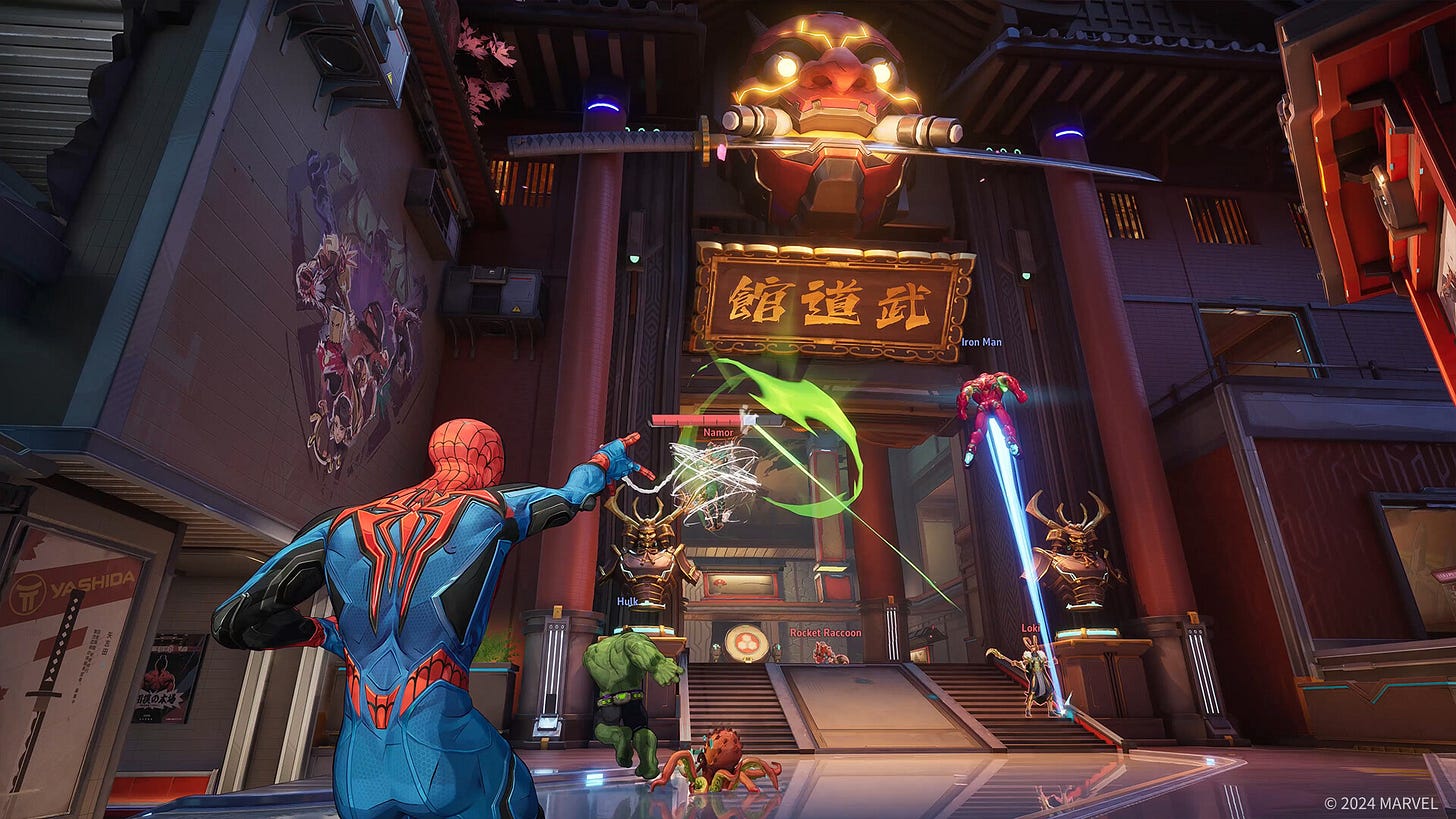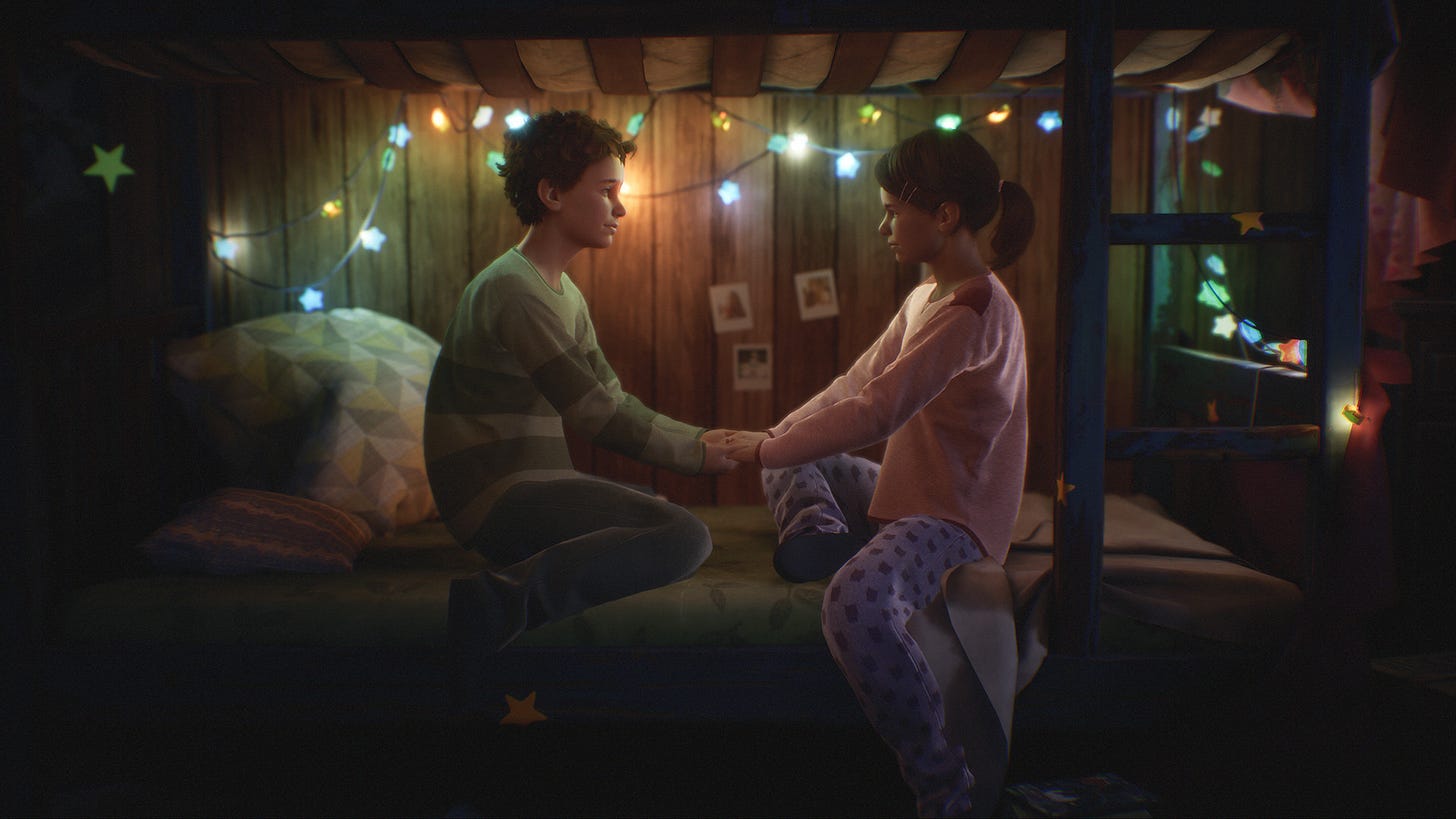Is the green washing off AAA gaming?
Are we about to see the era of green gaming and tech wither?
My guest for this issue of Multiplier is the multi-award winning journalist Alice Clarke. She’s been in the freelance game for almost twenty years and during that time her byline has appeared on both major mastheads like The Age and the ABC as well as more specialised outlets like Rolling Stone and Vogue. These days, you can find follow her work on Bluesky.
Editor’s note - In the two(ish) months between Alice and I having this chat, a LOT has happened with regards to Trump. I don’t believe recent developments invalidate anything either of us said but it’s worth including the context that this chat happened ahead of stuff like the Liberation Day tariffs or deportations.
Fergus: For all that the mantra of “Survive till 25” has done the rounds over the past year or two, the start of this year hasn’t offered much in the way of a change in tune for the gaming industry. Sure, the Switch 2 finally got confirmed but so too have fears that the mass layoffs seen over the last 18 months will continue.
Across the board, the vibes have been in shambles and the advent of the second Trump presidency hasn’t helped. To put it lightly, the gaming landscape is hardly the most important or only part of modern life likely to be affected by Donald Trump’s return to the oval office. All the same, it’s hard not to wonder about how the broader political shifts on the other side of the Pacific are going to affect the hobby and those in its orbit.
Over the past few weeks, we’ve seen Marvel Snap snagged up in the TikTok ban and more besides. Aggressive antitrust enforcement is out. Social media with as little moderation as possible is in. It’s difficult to imagine a world where those things don’t trickle down and reshape the gaming landscape, especially when it comes to big budget and AAA developers. In the wake of the inauguration, it feels like more and more companies are taking Trump’s triumph as an excuse to drop any or all the commitments they’ve made in the past towards a more sustainable or diverse way of doing business. As someone who’s always been really cynical of the idea that more ethical corporations are going to save us from the climate crisis, I’m not super shocked but I am curious what the short, medium and long term ripples effects of these things are going to be on the people who make games and the people who play them. Is gaming about to give up on going green?
Alice: I don’t want to be the voice of doom and gloom, but I have to admit that I have very little hope for this industry in the short term. Long term, we might be OK. But Jesus Christ are the next few years are going to be tough. We’re currently seeing what the GamerGate movement grew to. It was a harassment campaign and playbook that got Trump in the White House, and a deeply unhinged billionaire in his 50s (whose apparent primary motivator in life is trying to make 4Chan think he’s cool) gutting the US government with the help of a group of racist teens and engineers in their early 20s. Things are bad right now.
The US is, of course, not the centre of the universe, but unfortunately the US has a huge impact on the global game industry and the world economy is entangled so if they go down, none of the rest of us are going to have a good time for a while, either. While the incoming trade war Trump is trying to start likely won't affect digital sales of video games, it may have an impact on consoles, and disposable income if the predicted recession occurs. Couple that squeeze with the US labour board being gutted and Republicans calling for OSHA to be scrapped (reducing worker protections) and there is likely going to be a lot more layoffs and probably more crunch.
The global lurch to the right is reducing social and governmental pressure to do something, anything about climate change as we see a bunch of natural disasters obliterating cities and towns, and also the US is so into going back to segregation that a large portion of people in power have decided that “diversity, equity and inclusion” are bad concepts. There are a lot of powerful people trying to roll back any social progress for women, queer people, people with disabilities and people of colour right now, and a lot of US companies have completely caved. It is good to note that Apple and Microsoft are rebelling and refusing to give into the idea that the only people worthy of jobs and support are able-bodied, straight, white, cisgender men, but it’s wild to watch a decade of progress get wiped from corporations so quickly. This is also going to deeply suck for anyone in the video game industry who enjoys it not completely sucking. I remember how things used to be, and I do not want to go back to that.

As for climate change stuff, I’ve always been deeply sceptical of companies that have gone on about how recyclable their packaging is, how they don’t use harmful dyes in the manuals, etc. But at the same time they’re also releasing a bunch of non-repairable products that are barely different to the ones they released last year, with the aim of convincing people to buy stuff they don’t actually need, generating waste. It’s always come across as green-washing rather than an actual effort to make a difference. Don’t get me wrong, any amount of harm reduction is good, and virtue signalling genuinely is better than nothing (because it might encourage someone else to actually do something). At the same time, though, I would prefer it if they actually put their money where their mouth is and made products that last an extremely long time, are easy to repair, easy to recycle and if companies didn’t try to deliberately get people caught up in a hype cycle to encourage growth at any cost.
That’s not even touching on the complete disaster that is generative AI from every perspective other than that of a bean counter (worse for workers, players and the environment, but it costs less than an actual human, so let’s torch some more rainforest to keep the shareholders warm). Or how AAA games keep getting bigger and bigger at an unsustainable pace. Or how social media managers are about to have a significantly worse time due to reduced social media moderation and the worst people on the internet being emboldened.
Admittedly, that is a lot of doom and gloom. But unless people suddenly get a bunch of disposable income to spend on independent media outlets and non-AAA games, or three ghosts of Christmas visit the venture capitalists and CEOs in charge of major game developers, then things aren’t really looking up for the game industry for a while. If those ghosts did start visiting those who needed them, they would probably be sent to Guantanamo Bay, or something.
On the bright side (and there’s always a bright side), this will hopefully encourage people to strengthen their communities, find new ways to resist and create art, and new things will grow from that. Yes, there are apparently a lot of angry straight white men and TERFs who hate DEI and will gladly gobble up any garbage to own the libs. But there’s far more people who do not completely suck on every level, which means there is a market for games and art and writing for those people, even if the garbage people are pretty loud at the moment. A lot of us will get through this. That’s not exactly comforting, but it’s the best I’ve got at the moment.
Fergus: If we’re taking a long view perspective on things, games and the people who play them aren’t going anywhere. Humans have been making and playing games for thousands of years. The material, political and economic conditions of both ends of that equation may change over time but that through-line is the same as it has ever been. If anything, there’s a case to be made that – by volume – most games aren’t commercial at all.
The trope of games as a form of escapism is a pretty tired one but I’d be lying if I said that I hadn’t spent more of my time recently distracting myself with fantastical worlds beyond number as an alternative to doom scrolling from one end of social media to the other. All that said, I think that quality makes it very easy to fall into the trap of feeling like games exist outside the “real” world when they are inextricably tied to the conditions in it.
Commercial or not, the games we play are a product of the world we live in. As that world shifts and as this largely-manufactured backlash and curtailing of diversity as a value continues to play out, I do think we’ll see less funding for projects that champion that stuff and fewer incentives for companies to embrace sustainability as a virtue. The big-budget end of the industry has only gotten more risk-averse over the past decade or so and it’s hard to imagine them turning back now.
Assuming that the second Trump administration’s antics don’t cause the global economy to implode entirely, it seems apparent that the MO of this particular era is one where the US government is eager to pick petty fights, punch down and encourage harassment campaigns to add pressure by piling onto its enemies. Any pretense at neutrality by those operating in the games industry is likely only going to last until this or that publisher or studio finds themselves subject to the eye of Sauron. How long will it really be until Valve, Sony or Microsoft gets pressured to delist games from their digital storefront because they promote “gender ideology” or some other issue that the far-right has in its crosshairs?
The notion of political correctness seems fully en-route to return to its original meaning and it’s much easier to imagine the modern gaming landscape becoming an echo of Hollywood during the 1950s than an exception to that precedent. The one caveat that comes to mind here is that, contrasted to Hollywood, video games are a decidedly global industry. The North American market remains important but it’s not the only game in town.
When Marvel Rivals released late last year, there was a brief moment where its audience came head-to-head with the content moderation norms of a Chinese-developed multiplayer game. Perhaps we’re headed for a situation where titles released in the United States will soon be in a similar situation.
Alice: Bringing up Marvel Rivals as an example here is such good timing, given a lot of the US team got laid off recently, showing that even when a game is a commercial success, a company will still shaft everyone who made it successful so there’s more money for shareholders and execs.
As you say, escapism is important. But are most people willing to buy individual games with (justifiably) high price tags, when they have the option to just subscribe to Game Pass or something and get their variety that way? We know from the Spotify model that eventually that’s not going to be great for the people who actually make the games. Will that lead to a correction where the big games are no longer unreasonably huge, with ridiculous budgets and poor working conditions, and instead are smaller games made by teams of a sustainable size? Or will it mean that games become even more heavily reliant on on micro transactions and an underpaid, overworked, usually burnt out young workforce that isn’t yet fully aware of how executives are using their passion as a tool to exploit them? Games are never going away, even if most of the games made aren’t commercial successes (much like products of every other artistic medium). The question is less “will the games industry die” and more “will we be ok with what the mainstream industry becomes”.
As far as censorship goes, I wouldn’t be surprised if we went back to something like the Hays Code or 19th century English literature laws. While, of course, there will still be many indies who operate outside and around that, and we’ll see new visual languages that pop up to get around that censorship, I don’t want to go back to a world where the stories of my community can only be told through subtext. I love Xena Warrior Princess, but we’ve evolved beyond subtext and are richer for it. The Hays Code and those literature laws have had huge, long lasting hangovers that we still haven’t fully shaken. You can draw a straight line from those laws to the Bury Your Gays trope that has been so incredibly harmful. The original intent was to show that queer people cannot live long and happy lives, that they could only be included in the narrative as long as something bad happened to them in the end.
Taking this back to games, aside from player sexual characters, queer characters in mainstream games are incredibly rare as it is (except in PlayStation exclusive games, for some reason, where every lead woman is queer, and for this I am grateful). In its 2024 Gaming Report, GLAAD found that almost one in five gamers are queer, but that less than 2% of games included queer content. And that’s a huge improvement from where we used to be. It has taken so much work to get to where we are now in terms of representation, and I fear that’s all about to go away.
For those who haven’t had to go to great lengths to see themselves represented in the media they consume, it can be difficult to understand why it would matter. From the perspective of the underrepresented person, it’s huge. For a closeted queer kid who doesn’t know anyone like them who they can talk to, seeing a character like them can literally save their life, show them that it can be ok, that they can grow up to find their people. Representation can make you feel less alone, see that there are options. Representation is also important for people who might not know someone like that underrepresented character. The most famous example would be when Joe Biden credited Will and Grace for changing minds about marriage equality. You might not know a trans or queer person in real life, but you might watch Elle Argent in Heartstopper, or Nia Nal in Supergirl, or play Tyler Ronan in Tell Me Why and see that they’re not the boogeymen conservatives would have you believe. There is power in that. People fear the unknown.
Fergus: Unfortunately, fear (alongside greed) is often regarded as one of the bigger motivators when it comes to the way the market moves and I can’t help but apply that dichotomy to the decisions and behaviors that we’re seeing from the biggest players in the gaming space. It feels weird to frame it this way but if the last few decades have seen greed over the opportunity to reach new audiences by telling more diverse stories in gaming win out then I fear we might be about to see things swing in the other direction.
Even if queer stories don't disappear entirely, I think we’re about to see fewer big game publishers crowing about investing in them and a lot more Ubisoft-style denials that anything in or about a given game might be considered political. That strategy of appeasing cultural warriors on the conservative far-right will probably play out the same way it always does. Once they get what they asked for, they always ask for more. After all, their tactics got them what they wanted. Why wouldn’t they? Individual artists and smaller outfits won’t necessarily be swept up in this vibe-shift, but we’ve seen all too recently how fragile the platforms that corner of the landscape uses are.
Maybe there’s some hope to be found there though, even if it is filtered through the logic of capitalism. If the bigger players in the gaming space are too afraid to “say gay” then the audience that they’ve cultivated through their previous championing of those causes is going to disappear and not without a fight.
The myth of a more sustainable and diverse capitalism might be corporate puffery but if you've spent the past decade or so telling your customers to expect better then you really do only have yourself to blame for the consequences that comes with falling afoul of those expectations. When the only language you speak is fear and greed, you can only be so surprised if someone tries to use that against you.







